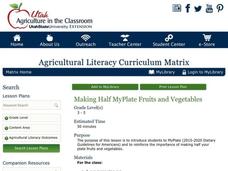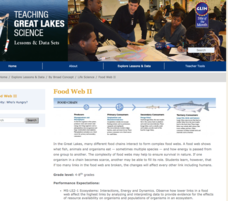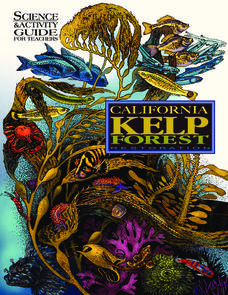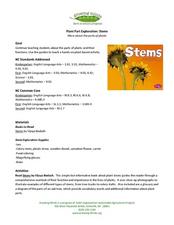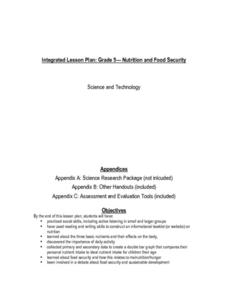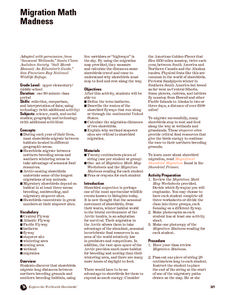NOAA
Understanding Food Chains and Food Webs
Jump into an exploration of marine ecosystems with the first lesson in this four-part series. After first learning about crustaceans, mollusks, and other forms of sea life, young marine biologists view a PowerPoint presentation that...
World Wildlife Fund
Arctic Food Chain
Explore the food chains that support Arctic ecosystems. A class discussion on interdependence and the different roles plants and animals play in ecosystems provides students with the knowledge to complete a worksheet asking them to...
Curated OER
Visual Vocabulary
Students interpret and name the vocabulary termed acted out by the mime. For this science/language arts/physical education lesson, students are given a set of vocabulary terms to discuss within their group. Next, students place all...
Curated OER
Electricity and Food: From Glowing Pickles in Citrus Batteries
Fifth graders explore electrical concepts and host a guest speaker. This lesson sets up guidelines for students to follow when they have a guest speaker. Students are primed to become actively involved in a lecture or discussion, while...
Agriculture in the Classroom
Making Half MyPlate Fruits and Vegetables
Establish healthy eating habits with a lesson focused around MyPlate's food recommendations and the importance of eating fruits and vegetables. Through class discussion and worksheet completion, scholars discuss the best choices of foods...
Curated OER
Sustainable Livestock
Students investigate healthy eating habits by researching livestock. In this food sustainability instructional activity, students research the negative impact factory farming has on our environment due to pollution. Students define...
Michigan Sea Grant
Food Web II
A food web consists of complex food chains and the more complex the web, the better likelihood of survival. Learners compare and contrast food webs and food chains and discuss concepts like the predator-prey and consumer-producer...
Dawn N . Ericson
California Kelp Forest Restoration
This unit is so cool, you won't be able to "kelp" yourself! Intended for all grades, this science and activity guide for teachers offers a unique opportunity to understand kelp's role as a valuable ecological resource. Teachers and...
Curated OER
Pesticide Watch Card
Students examine human health by identifying dangerous pesticides. In this agriculture lesson, students research the food production system in the United States and discuss dangers such as pesticides, chemicals and insecticides which...
Curated OER
Plant Part Exploration: Stems
Explore water transport in plant stems using this fun experiment! Your scientists will start by reading Stems by Vijaya Bodach. Then, activate prior knowledge about plant stem functions and water transportation. Demonstrate this concept...
Curated OER
Rainforest Food Chain
Young scholars investigate a rainforest food chain. For this ecology lesson, students are shown pictures of plants and list what animals might eat the plants. Young scholars continue to think of what other animals might eat those...
Alabama Wildlife Federation
Fill the Bill
A hummingbird isn't the only bird with a unique beak. After a discussion about the specific characteristics of bird beaks, pupils complete a station rotation and use different tools to simulate the function of different beaks. They...
Chicago Botanic Garden
Ecological Mismatches
Modeling is a powerful teaching tool. The final installment in a six-part series has pupils complete an activity to model a food web and discover the interconnected relationships in an ecosystem. They then read about changes in migratory...
Curated OER
Ecology - Food Chains
Learners discuss the concept of a food chain in the California ecosystem. in this food chain lesson plan, students look at different cards and sort them into herbivores, carnivores, decomposers, and omnivores. Then they use these cards...
Curated OER
Prairie Food Chains & Webs
Learners complete a food chain. In this ecosystem lesson, students learn about producers, consumers and decomposers. Learners identify herbivores, carnivores and omnivores and complete two worksheets.
Curated OER
Creating a Food Web
Young scholars investigate hunters and prey by creating a food web. In this animal life lesson, students investigate a single organism in preparation for a field trip, discovering its diet and habitat. Young scholars each discuss their...
National Park Service
Reduce Our Carbon Footprint, Let’s Compost!
Roll up your sleeves and get a little dirty with this elementary and middle school compost lesson plan. All you need is a large plastic container, a couple old newspapers, some organic waste, and a few hundred worms and you're ready...
Curated OER
Dining Out With Fishes and Birds of the Hudson
While this instructional activity focuses on the birds and fish found on the Hudson River, it could be adapted for use in any classroom. Using a vocabulary list, learners explore the meaning of words like adaptation, habitat, barbel, and...
Curated OER
Nutrition and Food Security
Examine the three basic nutrients and their effects on the body. Fifth graders will research data to construct a bar graph and then demonstrate the relationship between malnutrition and food security. This is a very comprehensive...
Education Outside
Papermaking
Imagine recycling food scraps and using them to make paper. The directions are all here in a seven-page packet that details several paper-making strategies.
Prince William Network
Migration Math Madness
A great way to incorporate math into life science, this lesson has learners measure migratory routes on a map and calculate the actual distance that shorebirds on the routes would cover. Learners compute the distance covered in both...
Oklahoma State University
Hairy Heredity
Young scholars learn that heredity comes down to the flip of a coin with this cross-curricular math and science lesson. Using smiley faces as a model, young scholars toss coins to determine which dominant or recessive traits will be...
Alabama Learning Exchange
Light, Dry and Nutritious - A Look at Dehydrated Food
Fifth graders study dehydration and dehydration of foods. They measure the amount of water lost from fruits as they are dehydrated. They use desktop publishing software to design an advertisement for dehydrated fruit after researching...
Curated OER
The Food Chain Game - A Lesson in Ecosystems
Learners are divided into three groups, herbivores, omnivores, and carnivores which receive a certain number of lives. Once in their ecosystem (outside or the gym), the carnivores chase and eat either the herbivores or omnivores, the...






